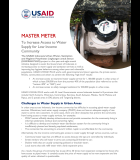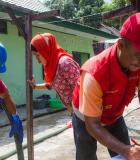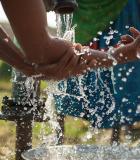Marine Protected Areas Governance Program (MPAG)
Indonesia is located at the epicenter of the Coral Triangle – an area of outstanding marine biodiversity including the waters of Indonesia, Malaysia, the Philippines, Papua New Guinea, the Solomon Islands and Timor-Leste. In 2007, then Indonesian President Yudhoyono initiated a multilateral partnership to safeguard the region’s extraordinary marine and coastal biological resources. Coral reefs are habitats for the majority of fish caught by coastal fishers and support millions of jobs and subsistence livelihoods in Indonesia. Yet, the marine and coastal natural resources of the Coral Triangle – and the many goods and services they provide – are at tremendous risk from a range of factors, including: overfishing, unsustainable fishing methods, land-based sources of pollution and climate change. In addition, with more than 17,000 islands, 81,000 km of coastline and 3.2 million km2 of ocean, Indonesia’s Ministry of Marine Affairs and Fisheries (MMAF) confronts complex and significant marine management challenges.
Activity Description
At the national level, MPAG provided technical assistance in the establishment of marine protected areas (MPAs) by supporting regulations and policies, primarily through the development of MPA Management Effectiveness Indicators, also referred to as E-MPA or E-KKP3K - a MPA management effectiveness measurement tool and related guidebooks developed specifically for those involved in MPA management. With the EKKP3K, the KKJI Directorate now has established a baseline for the management status of all MPAs in Indonesia allowing for more effective resource allocation and the provision of targeted support for local governments to better manage and utilize their own MPAs.
MPAG also provided technical support to local government partners, assisting them in the MPA designation process by providing full-time staff who worked with Marine and Fisheries Agency staff. MPAG also engaged local universities to assist with the development of local government policies to further support the designation and effective management of their respective MPAs. The MPAG NGO consortium members have committed to continue to support these MPAs into the future, using other funding sources.
Capacity building for MPA managers is now gaining momentum in Indonesia. The first Specific Competence Standards for Work (SK3), based on the SK3 for MPA Design and Planning and jointly developed by the Directorate of KKJI and Puslat BPSDM (Training Center, Agency for Human Resources Development) will underpin marine conservation activities by ensuring that all MPAs are managed by competent staff. The infrastructure for this certified training is now in place, with further development to be provided by local governments. In due time, all MPA management staff in Indonesia will be officially certified with technical competences required to complete their work. The government has accepted responsibility for the management of this program under the leadership of the Puslat BPSDM and Directorate of KKJI. It is hoped that this government ownership will ensure the sustainability of this program and benefit MPAs in the long-term.
Expected Outcomes
- Provide support for the management of 8 MPAs covering a total area of 8,027,397 hectares
- Establishment of MPAs spanning 2 million ha, starting from a baseline of 700,000 ha in 2010; and
- Effective management of MPAs spanning 4.5 million ha, starting from a baseline of 900,000ha in 2009.
Actual Outcomes
- MPAG supported the designation of new MPAs spanning 1.7 million ha and the improved management 7.5 million ha of MPA
- Development of Ministerial Regulation on MPA





